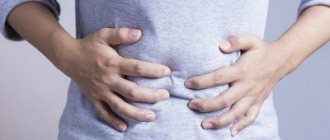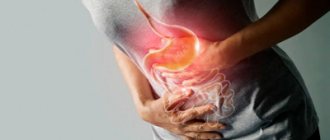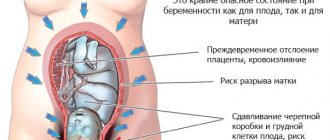If gastritis is chronic, then the patient has time to undergo a full examination, consult a doctor, and select adequate therapy.
However, no one is immune from the fact that the disease suddenly worsens - an attack of gastritis develops.
In such a situation, it is necessary to quickly alleviate its symptoms and stabilize the condition. Meanwhile, the patient is not always prepared for emergency situations and often does not have the necessary medications on hand. In this article we will try to sort out all the manifestations of acute gastritis and tell you how to act correctly during an attack.
Causes and provoking factors
An acute condition never develops out of the blue. It is preceded by provoking situations that we do not always pay attention to. Possible causes of an attack include:
- Diet violation. This is the most common causative factor. Even a small piece of fried, smoked, excessively fatty food, as well as a few sips of soda or alcohol, can cause acute pain and digestive disorders. Food that is too cold, too hot or too coarse fiber is also a danger.
- Dietary disorder. Too frequent or infrequent lunch breaks can disrupt the cyclic production of enzymes and cause an increase in the inflammatory process.
- Binge eating. Even the most dietary foods, eaten in excessive quantities, cannot be completely digested and cause symptoms of acute inflammation.
- Poor quality food. If products have been stored incorrectly or have already passed their expiration date, then the microbes that have multiplied in them can easily cause an exacerbation of gastritis. They are dangerous even for a healthy digestive system, and even in the presence of chronic inflammation, an acute attack of gastritis is guaranteed.
- Untimely cessation of treatment. Most patients with chronic gastritis are forced to take special medications for a long time that improve food digestion and restore the gastric mucosa. If the therapeutic course has not yet come to an end, and the medication has already been stopped, then the stomach, deprived of the necessary support, will react with an exacerbation.
- Viral infection. If you catch a virus that affects the digestive tract, then be prepared for an exacerbation of all its chronic diseases, including gastritis.
- Taking anti-inflammatory drugs or glucocorticoid hormones. These drugs have an aggressive effect on the inner lining of the stomach and intestines, promoting the formation of erosions and ulcers. For chronic gastritis, just one tablet with these properties can significantly worsen your health.
- Stress. Against the backdrop of excessive stress and an unstable emotional state, adrenal hormones (“stress hormones”) are released into the blood in large quantities, which negatively affect the gastric mucosa, causing the formation of erosions.
- Smoking. Nicotine and tar contained in cigarettes enter the gastric mucosa through the blood and irritate it. Therefore, smoking a large number of cigarettes in a short period of time is quite capable of triggering an acute inflammatory reaction.
general characteristics
Acute gastritis appears suddenly when the gastric mucosa is damaged by chemicals, drugs or poor-quality food. Usually its symptoms are so pronounced that most patients immediately consult a doctor. In many cases, this form of the disease requires hospital treatment. But still, in almost half of the patients it is not possible to cure the pathology completely, and it becomes chronic.
Chronic gastritis can also develop as an independent disease. The reasons for this have not yet been clarified by scientists, but it is believed that inflammation of the mucous membrane can be triggered by stress, poor diet, bad habits, as well as infection with the Helicobacter pylori bacterium. In this case, the disease is usually accompanied by abdominal discomfort, indigestion, flatulence, and intestinal upset. Chronic gastritis can occur with low or high acidity of gastric juice. Symptoms may vary slightly.
The chronic form of the disease is characterized by the fact that the condition periodically improves, and such remission can last indefinitely. And at the initial stage of the pathology, the patient does not experience obvious discomfort.
Important: even with a slight violation of the diet or when exposed to unfavorable external factors, gastritis worsens.
Timely initiation of treatment can quickly improve the condition. But in some patients, the duration of the exacerbation can reach several weeks or even months.
With chronic gastritis, the walls of the stomach become inflamed, and there is a decrease in mucus production, which protects them from the aggressive effects of hydrochloric acid. Typically, this process is sluggish and, if you follow a diet, may not cause any symptoms. With increased acidity of gastric juice, ulcers and erosions form on the mucous membrane, which can bleed. All this leads to disruption of food digestion. In addition, the inflamed mucosa reacts sharply to any aggressive influences. An exacerbation of the disease occurs.
Inflammation of the mucous membrane can worsen for various reasons, often ulcers or erosions form on its surface
Unlike acute gastritis, an attack of its chronic form may not appear immediately after exposure to provoking factors, but after several hours. In addition, its manifestations will not always be pronounced; only a slight deterioration in the condition is possible. It is also impossible to say exactly how long the exacerbation lasts. Each patient is different.
Some people immediately change their diet and start taking the necessary medications. Sometimes in this way it is possible to stop the exacerbation in a few days. But in some patients this condition can last indefinitely.
A feature of gastritis is that exacerbation of its chronic form occurs simultaneously in many patients, regardless of behavior and diet. Therefore, they say that this disease is characterized by seasonality, because most patients have exacerbations in spring and autumn. But with a serious violation of the diet and medical recommendations, gastritis can worsen at any time. In the most severe cases, this condition lasts for years, only bringing relief for a short time.
Symptoms
The main signs of acute inflammation of the stomach are very characteristic:
- sharp, bursting, burning pain in the upper abdomen, often in the epigastrium or left hypochondrium;
- nausea, a feeling of fullness in the stomach, even if you have eaten a small amount of food;
- vomiting, usually once or twice, bringing relief;
- heartburn, discomfort along the esophagus, especially with high acidity;
- belching of sour or eaten food with increased gastric secretion, belching of rotten with reduced;
- general weakness caused by substances that are released during acute inflammation, or dehydration due to vomiting;
- diarrhea is not the most typical for an attack of gastritis, but a possible symptom, especially characteristic of an infectious process;
- bloating and pain along the intestines are characteristic of a hypoacid state;
- An increase in body temperature is observed when poisoned by poor quality food or a viral infection.
The duration of the attack is very variable: it can last from several hours to 7 days. It all depends on the severity of the inflammation and the measures taken.
Attention! If the symptoms are severe and self-treatment does not bring relief, then you should immediately seek medical help. Under the mask of an attack of gastritis, dangerous conditions such as perforation of an ulcer, biliary colic, phlegmonous gastritis, and acute pancreatitis can be hidden.
How to treat an acute condition
Help during an attack comes down to reducing its main symptoms. First of all, you need to solve the nutrition issue. Usually, on the first day, complete fasting is necessary; you are only allowed to drink still water.
For 2-3 days you can eat only what practically does not stimulate the gastrointestinal tract: slimy porridges, mashed potatoes, jelly. You can get acquainted with the nutritional features during exacerbation of gastritis in this article.
Advice. You can alleviate the condition if you lie on your side in the fetal position - pull your bent legs to your stomach, arch your back. Warm (but not hot!) drinks also help relieve spasms.
What can gastritis be easily confused with?
According to gastroenterologist Alexey Golovenko, most of the symptoms that many associate with “gastritis” have nothing to do with inflammation, stomach ulcers, or dangerous bacteria. A feeling of heaviness in the stomach after eating, fullness in the pit of the stomach, nausea or severe weakness after fatty foods most often indicate functional dyspepsia - that is, a disruption of the digestive process. First of all, we are talking about a violation of motility (motor activity) of the digestive organs, which can be caused, for example, by stress. To improve the condition, it is usually enough to take prokinetics (for example, domperidone or itopride) - drugs that stimulate gastrointestinal motility. Psychotherapy and antidepressants can also help, but they must be prescribed by a doctor.
Alexey Paramonov emphasizes that for any discomfort in the abdomen, it is unsafe to use classical painkillers: most of them themselves can lead to an ulcer. The first aid remedy for acute stomach pain is antacids that neutralize gastric acid. Another effective option is the so-called proton pump inhibitors, which also reduce acidity. But you still need to visit a doctor: it is important to understand the cause of the ailment and undergo treatment. For example, pregnant women often complain of so-called reflux disease or pregnancy heartburn, when acid from the stomach enters the esophagus. And if you don’t need to follow a special diet for gastritis or dyspepsia (the benefits of Soviet “tables” have not been scientifically proven), then in this case the diet will have to be changed. Such a diet will not be strict and certainly will not interfere with the development of the fetus.
If pain in the upper abdomen, heartburn, belching, nausea appeared for the first time and you are under forty-five years old, there is no point in doing gastroscopy: treatment for dyspepsia can be prescribed without looking into the stomach.
According to the recommendations of the American College of Gastroenterology, gastroscopy is relevant when there is a possibility of detecting an ulcer, metaplasia or tumor. Symptoms of such conditions: discomfort when swallowing, iron deficiency anemia, frequent vomiting, unintentional weight loss of more than 5% over six months. Otherwise, it is enough to perform a breath test for Helicobacter and eliminate the bacteria if found. Only if after this your health does not improve, you need to undergo a gastroscopy with a biopsy - the latter is mandatory to confirm gastritis and allows you to assess the risk of developing stomach cancer in the future.
If you are over forty-five years old or one of your close relatives has had stomach cancer, then at the first “stomach” complaints the doctor will prescribe a gastroscopy. This examination can detect not only gastritis, but also, for example, inflammation of the esophagus (esophagitis) or ulcers. There is no alternative to the unpleasant procedure yet, but in order not to suffer from “swallowing your gut,” you can already be examined under anesthesia. There is progress in the treatment of peptic ulcers. Alexey Paramonov says that twenty years ago it was possible to cope with it by removing part of the stomach. Now surgeons recommend surgery only in an emergency situation, for example, if complications have already arisen - and in other cases, the affected areas of the stomach are simply cauterized using a laser or radio waves.
How to quickly relieve pain
The following medications will help relieve pain:
Antispasmodics (No-shpa, Papaverine, Buscopan). By relaxing the muscles of the gastric wall, irritation of its receptors will stop and the pain will subside.- Antacids that reduce acidity (Gastal, Gaviscon, Almagel). The drugs are used if a diagnosis of hyperacid gastritis is established; with low acidity, they can aggravate the disorders. Almagel A, which contains a local anesthetic, is especially effective in relieving pain. At home, it is permissible to take a weak solution of soda (1 tablespoon per liter of water), but only once if there are no pharmaceuticals at hand.
- Antisecretory drugs (Omeprazole, Nexium, Nolpaza, Ranitidine) are also used for hyperacid conditions. The effect of these medications appears slowly, but it is for this reason that they should be taken as early as possible.
- Enzymes (Pancreatin, Mezim, Creon) are needed to reduce pain in hypoacid or atrophic gastritis. They also give a delayed effect. However, it is worth considering that acute pain syndrome is not typical for inflammation with low acidity.
What to do about other symptoms
In the fight against nausea and vomiting, Cerucal or Motilium are indispensable. Motilium is available in the form of tablets that dissolve in the mouth. Due to this, they do not additionally provoke the gag reflex and are quickly absorbed. Cerucal is more convenient to use in the form of intramuscular injections. This way, it quickly enters the bloodstream and starts working.
The same antacid medications will relieve heartburn To get rid of loose stools, Loperamide or sorbents (Smecta, Polysorb, Activated Carbon) are used, which also help remove toxins during an infectious disease.
Antibiotics and antiviral agents are prescribed by a doctor if the infectious nature of the disease is confirmed. You should not take such medications on your own.
Important! If you have diarrhea and vomiting, you need to drink a lot to replenish fluid losses. If you can’t drink because of vomiting, then this is a serious reason to call an ambulance. In such a situation, hospitalization in a hospital and intravenous infusions with special solutions are necessary.
Prevention
By following simple rules, you can minimize the risk of exacerbation of gastritis:
- Follow your diet and nutrition regimen. Mechanical, chemical, thermal sparing are the “three pillars” on which healthy digestion rests. Meal breaks should be regular and portions should be small.
- Get rid of bad habits. Alcohol and smoking have a negative effect not only on the heart and blood vessels, but also on the gastrointestinal tract.
- Buy proven products and monitor expiration dates. Choose only large supermarkets that are strictly controlled, pay attention to the date of manufacture of the product.
- Follow the doctor's instructions , do not give up treatment for gastritis halfway, this will only worsen the problems.
- Fight stress . If you cannot avoid them, take mild sedatives and consult a psychotherapist.
- anti-inflammatory and painkillers with caution You can find tips on how to use them safely by watching the video.
An acute attack of gastritis is a serious condition that often requires qualified medical care. Even if you managed to relieve the main symptoms on your own, you still need to go to the clinic after that. A therapist or gastroenterologist will conduct an examination, rule out other diseases with similar manifestations, and, if necessary, refer you for examination. Medical recommendations will help to avoid severe exacerbations in the future.
Causes
Exacerbation of gastritis most often develops in those patients who violate the diet or other doctor’s recommendations. But there are so many factors that can trigger an attack that it is difficult to avoid.
Typically, the chronic form of the pathology is aggravated due to poor nutrition. Diet is the main factor that can slow down the progression of this pathology. Eating on the go, quickly absorbing it, insufficient chewing or long breaks between meals has a negative impact on the condition of the mucous membrane.
Attention: exacerbation can also be triggered by overeating, consumption of fast food, carbonated drinks, spicy or fried foods, cold or hot food.
Often exacerbation of gastritis occurs during pregnancy. This may be due to changes in a woman’s diet, hormonal imbalances or a lack of essential microelements. In addition, stress is a common cause of an attack. Any nervous shock or experience leads to increased secretion of the digestive glands, and vasoconstriction also occurs, leading to disruption of tissue nutrition.
In addition, there are other causes of exacerbations of chronic gastritis:
- drinking alcohol or smoking;
- food poisoning;
- penetration of toxic substances or chemicals into the stomach;
- hard physical work;
- decreased immunity;
- development of other pathologies of the gastrointestinal tract;
- infectious and inflammatory diseases;
- allergic reactions;
- use of non-steroidal anti-inflammatory drugs, antibiotics, hormonal agents.
Recently, scientists have proven that exacerbation of gastritis may be associated with the spread of Helicobacter pylori bacteria. This is the only microorganism that can survive in the acidic environment of the stomach. It is believed that almost all people have these bacteria, but they provoke the development of gastritis only with increased activity.
Seasonal exacerbations
Many patients understand that gastritis is a seasonal disease. But not everyone understands why it worsens in spring and autumn. A spring exacerbation may be associated with a change in daily routine and diet, as well as with a decrease in immunity. The first green vegetables appear, with which some people try to compensate for the lack of vitamins. But the inflamed mucous membrane reacts negatively to the abundance of greenery.
Autumn exacerbation may be associated with a sharp change in people’s diet and their emotional state. Reducing daylight hours has a depressing effect on many, and stress is the factor that often causes exacerbation. In addition, the season of viral diseases begins in the fall, which people often cope with using drugs that damage the gastric mucosa.







